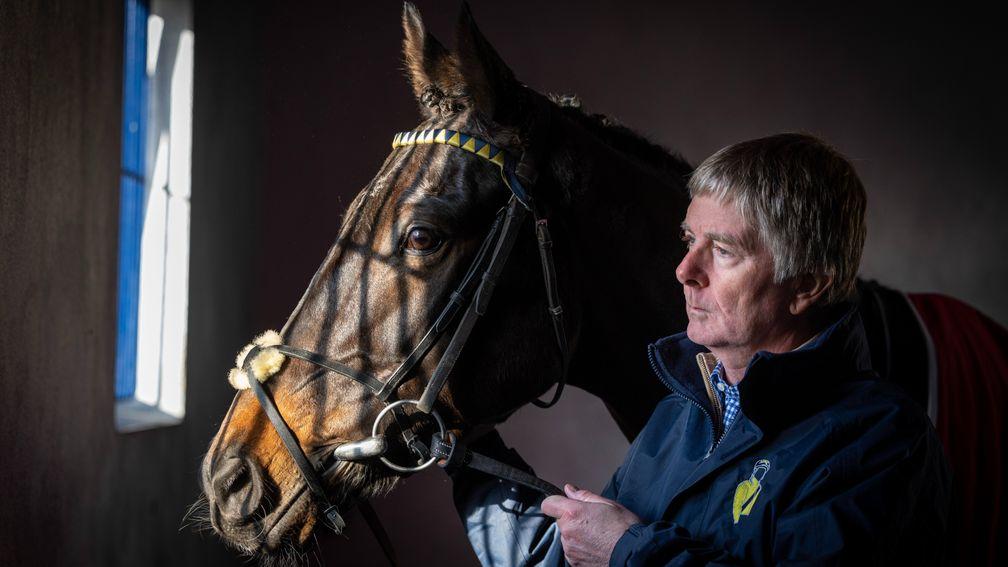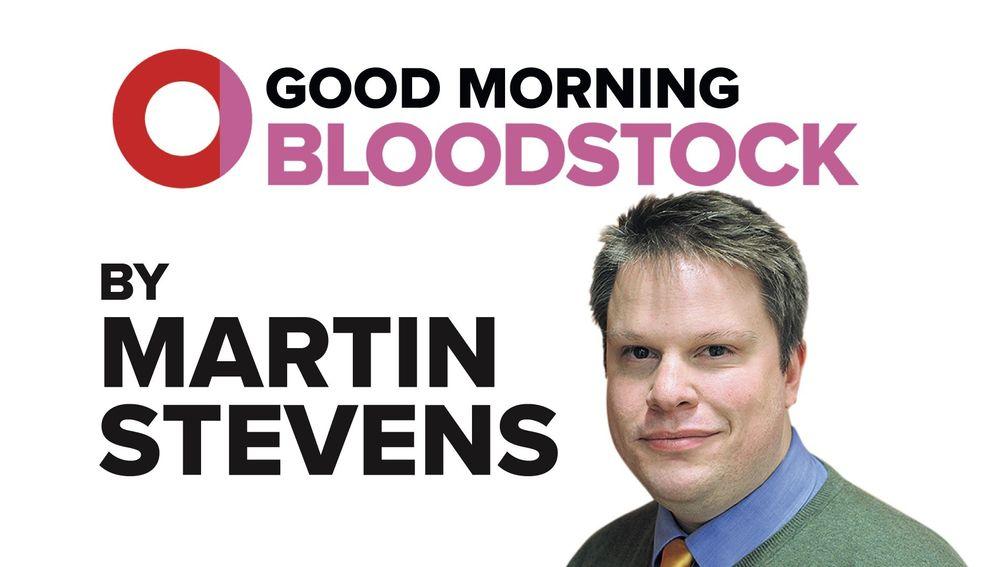- More
The amazing tale of triumph over adversity behind a star novice hurdler
Martin Stevens speaks to John Fitzell about his extraordinary story

Good Morning Bloodstockis Martin Stevens' daily morning email and presented online as a sample.
Here he speaks to Ballykelly Stud's John Fitzell about his remarkable journey. Subscribers can get more great insight from Martin every Monday to Friday.
All you need do is click on the link above, sign up and then read at your leisure each weekday morning from 7am.
Only a few people in Cashel and the wider Irish bloodstock community will be aware of the incredible tale of triumph over adversity that lies behind the breeding and rearing of star novice hurdler Marine Nationale.
The fact that John Fitzell, who guided the early life of Barry Connell’s unbeaten Royal Bond winner in his role as manager of John B O’Connor’s Ballykelly Stud, is not more widely known and hasn’t appeared in print until now – as far as I’m aware – in spite of having run a successful farm while battling serious illness for 25 years and needing a wheelchair for the last 15 of those, only serves to illustrate his quiet determination not to be defined by his disability.
John worked at Coolmore in the early 1990s before moving to Ballykelly Stud, then still owned by the conglomerate, on the advice of Paul Shanahan. He spent five years prepping yearlings there before O’Connor bought the property, in what might very well be the last case of Coolmore selling good land for raising horses in Ireland.
John was in his early 30s, newly married and had a dream job managing a private stud for an ambitious new owner; he appeared to have been dealt a good hand by life. But, cruelly, he was about to draw a most unwelcome card from the pack.
“I got married on August 3, 1996, I had a disc taken out of my back on March 23, 1997, and I was told I had multiple sclerosis on January 6, 1998,” he recalls. “It was a bad bang to receive so early in life, but look, I’m still here and I’m one of those guys that if you tell me I can’t do something, that’s when I break my backside going about doing it. I’ve always thought more about the abilities I have than those I don't.”
Multiple sclerosis – a condition that affects the brain and spinal cord and has a range of symptoms, in John’s case a loss of leg movement – was a particularly galling diagnosis for a keen sportsman from a well-known GAA family who was as fit as a fiddle.
“I was very active, I played a lot of handball, hurling, soccer and first division squash, and in one fell swoop all my sports went to zilch,” he says. “That was a bitter pill to swallow and it can still get me down. I think I’m entitled to say to myself sometimes, ‘Why me?’ Not that I’d wish it on anyone else either, of course.”
John doesn’t allow himself (or me) to remain negative for long, though, and he quickly adds: “But hey, it’s just the way it is. We got around it.”
He got around it, and has overseen the smooth running of a farm that has 18 horses, with the assistance of his beloved wife and “superwoman” Catherine, his understanding employers John and Mary O’Connor and a close-knit circle of friends and family.
John says: “It’s my lower limbs that are the big problem. I can stand up but I have to use a zimmer frame, and trying to move forward is an awful job trying to shuffle my legs. I can feel them, but I just can’t move them where I want to go, it makes no sense.
“But when it happened, JB [as he calls his boss] said you’ve got eyes, you’ve got hands, you can still operate – you’re still a major cog in the operation – and they adapted a car so that I could drive it around the stud using hand controls. It’s half my day’s work getting into the jeep with a system of hoists, but once I’m in it that’s my office for the day.
“The green machine, as it’s known to everyone around here, gave me a new lease of life. I can take away the mares for covering, and I’ve been all over Ireland visiting various stallion farms over the years.”
John does everything on the stud bar physical work, which naturally can be deeply frustrating when he might want, for example, just to pick up a horse’s leg to inspect its foot. But all the staff on the stud, including the visiting farrier and vets, have adapted their way of working to include him.
“Oh it can be annoying all right,” he says. “You take simple things like opening a gate for granted when you can do them. In fact, I was so fit from all the sports when I started at Ballykelly Stud that I wouldn’t even bother opening gates, I’d just pop over them. Now I can’t move my legs through the ground even to be able to stand at the gate.

“I’ve also had a few lads through my hands here, teaching them the ropes of rearing horses, and that’s another big frustration: trying to explain things to them without showing them how to do it myself.”
Sensing he might be allowing a little self-pity to creep into the conversation, however much it is warranted, he quickly corrects himself and says: “But my eyes still work, thank God, and I’ve saved a good few horses over the years when I’ve been going around the stud looking at the stock and seen them down in the early stages of colic.”
He also has the exciting Marine Nationale and the classy hurdling mare Indefatigable, another bred by Ballykelly Stud, to show that he is doing something right from the driver’s seat of the green machine.
“I remember taking Marine Nationale’s dam Power Of Future – a fine, big individual with a great temperament – to Kildangan Stud to be covered by French Navy,” says John, who goes on to explain that mares are sent away for foaling but arrive home with their newborns very quickly.
“The foals can be only two days old, and if they’re happy enough we’ll start them off on a head collar,” he continues. “Their prep starts on that first day they come through the gates of Ballykelly Stud, as far as we’re concerned. The more handling they receive, the better.
“Marine Nationale was always a good foal, correct and strong. We had him here as a foal and yearling and then at two he went to Sam Curling to do some bits and pieces. His victory in the Royal Bond was mighty. Seeing a horse you’ve raised win a Grade 1 is the biggest kick of all, and what we're all trying to achieve.”
John leaves all the mating plans to JB, which sometimes results in him having progeny of rather unconventional sires to look after on the farm. Marine Nationale, by the former Darley Club sire French Navy, and Indefatigable, by the able but often overlooked Schiaparelli, are two good examples.
“I have to admit I do roll my eyes at some of JB’s choices,” says John with a chuckle. “It looks a bit of a lottery to the rest of us, doesn’t it? If it works, though, then great. I tend to leave all that side of things to him, and I’ll get on with looking after the day-to-day running of the stud.”
As you can tell, John hasn’t lost his sense of humour, and although he is thankful to JB for all he has done since his diagnosis, they have a normal employee/employer relationship, complete with occasional clashes.
“JB’s been so supportive and things might have been very different for me if I hadn’t been here,” he says. “I could’ve been finished. He’s also very good in saying that if I don’t feel up to coming down one morning then I don’t need to, but I try to resist that because if I don’t go on Monday then I might not go on Tuesday either, and before I know it I’ll be sitting at home twiddling my thumbs. Give me horses to look at every time.
“At the same time, though, JB and I are both big boys and wear long trousers, so he gives me the odd jibe, and I might have to bide my time but I find the moment always comes round for me to get one back at him. The last thing in the world I’d want is to be pussyfooted around.”
I spoke to JB himself to find out more about the seemingly hare-brained breeding of Marine Nationale – come back tomorrow to find out why he chose French Navy, and how the horse became an expensive point-to-pointer without ever running in a point – but before I got on to equine matters I asked whether he was ever concerned that it might appear to others that he continued to employ John as an act of charity.
The answer was unhesitating and unambiguous. “No. I’m the net beneficiary,” he said. “There’s absolutely no doubt about that. I couldn’t have done anything at Ballykelly Stud without John Fitzell.”
What do you think?
Share your thoughts with other Good Morning Bloodstock readers by emailing gmb@racingpost.com
Must-read story
“It's been bright, sunny and beautiful and with Cheltenham being off a lot of owners have come here to see the yard as they haven't been able to go racing. It's been quite enjoyable,” says Ben Pauling as the Racing Post finds out how trainers are dealing with the Arctic weather sweeping Britain and Ireland.
Got a friend that will like Good Morning Bloodstock?
Send them the link racingpost.com/goodmorningbloodstock and they can sign themselves up to receive it each weekday morning!
Don’t miss ANZ Bloodstock News
Subscribe for free for the latest bloodstock news from Australia, New Zealand and beyond.

Good Morning Bloodstock is our latest email newsletter. Martin Stevens, a doyen among bloodstock journalists, provides his take and insight on the biggest stories every morning from Monday to Friday
Published on inNews
Last updated
- Telescope, sire of Supreme Novices' hero Slade Steel, relocates to Foxwood Farm
- Royal Ascot winner Arizona on the move as Coolmore sire joins the exodus to Turkey
- Something different for Burrows as Group 1-winning trainer consigns at the Tattersalls Cheltenham December Sale
- Breeding right to Blue Point sells for €430,000 on Darley winning bid platform
- Classic hero Metropolitan set for strong home support with Etreham busy at the sales
- Telescope, sire of Supreme Novices' hero Slade Steel, relocates to Foxwood Farm
- Royal Ascot winner Arizona on the move as Coolmore sire joins the exodus to Turkey
- Something different for Burrows as Group 1-winning trainer consigns at the Tattersalls Cheltenham December Sale
- Breeding right to Blue Point sells for €430,000 on Darley winning bid platform
- Classic hero Metropolitan set for strong home support with Etreham busy at the sales